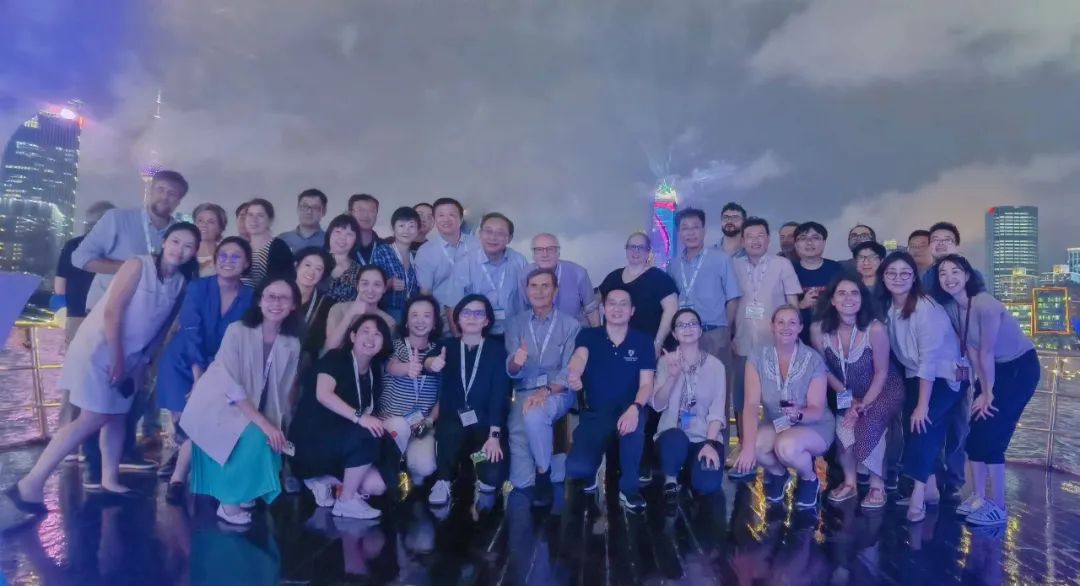On June 28-30, 2023, Cell Symposiaon Myeloid Cells: From development to function and dysfunction, co-organized by Cell Press and Shanghai Jiao Tong University School of Medicine and Shanghai Institute of Immunology, was successfully held at Shanghai Jiao Tong University School of Medicine. The conference was initiated and organized by Professor Bing Su, Director of Shanghai Institute of Immunology, Shanghai Jiao Tong University School of Medicine, Professor Florent Ginhoux, laboratory director of Gustave Roussy,adjunct professor of Institute of Immunology, Shanghai Jiao Tong University School of Medicine, Dr. Cheri Sirois, Senior Editor of Cell, and Dr. Bruce Koppelman, Senior Editor of Immunity.
21 world-renowned scientists from 10 countries including China, USA, Italy, Netherlands, Switzerland, Germany, UK, Singapore, Australia and France, were invited as speakers to share their latest research advances on myeloid cells and related fields. More than 400 students and researchers from 15 countries, including China, the United States of America, France, Italy, Singapore, Germany and Spain, registered for the conference.
Dr. Cheri Sirois opened the conference at 14:00 pm, June 28, thanking Prof. Bing Su, Prof. Florent Ginhoux, and Dr. Bruce Koppelman for co-organizing the conference and inviting them to the stage to welcome all the participants on behalf of the organizing committee.
Academician Xianqun Fan, Vice President of Shanghai Jiaotong University, Chancellor of the School of Medicine of Shanghai Jiao Tong University,representing the School of Medicine, delivered a welcome speech, in which he expressed his sincere gratitude and heartfelt thanks to all the experts and scholars from all over the world. Chancellor Fan pointed out that this conference is a heavyweight international academic conference held by the School of Medicine this year, and hoped that this conference would provide a platform for scholars and researchers to learn and communicate in depth. Chancellor Fan said that Shanghai Jiao Tong University School of Medicine, as one of the best medical schools in China, has established partnerships with 64 universities and research institutions in 21 countries and regions; in the past decade, the School of Medicine has developed rapidly in immunology research and has a series of high-level scientific research results published in the top international academic journals such as Cell, Cancer Cell, Immunity, etc. He believed that this symposium would promote the development and progress of immunology by sharing and discussing the cutting-edge advances in immunology research, especially in the field of myeloid cells. Finally, he expressed his gratitude to Cell Press, especially Dr. Cheri Sirois, Senior Editor of Cell, and Dr. Bruce Koppelman, Senior Editor of Immunity, for organizing this conference on the SJTU Medical School campus, and wished the conference a great success.
After that, Prof. Bing Su gave an opening remark. He expressed his gratitude to the leadership of the medical school, the partners from Cell Press, and the colleagues from Shanghai Institute of Immunology for their great support and effort. He expected that the conference will promote communication and collaboration among researchers from all over the world, and contribute new ideas, wisdom and consensus to the new challenges and opportunities facing the scientific community by sharing cutting-edge scientific advances.
The two-and-a-half-day symposium invited two world's leading immunologists as keynote speakers: Professor Marco Colonna from Washington University in St. Louis and Professor Alberto Mantovani from Humanitas University in Italy. Another 19 renowned experts from top universities and research institutes at home and abroad, active in the frontier of immunology research, shared their work as invited speakers, mainly focusing on five topics: "The ontogeny and basic function of myeloid cells", "the interaction between myeloid cells and other cells", "Myeloid cells in disease states", "metabolic regulation of myeloid cells" and "myeloid cells and tumors".
Twelve young scientists or graduate students were selected as Short-talk presenters through poster registration to share their latest research achievements in their respective immunology research fields. In the poster session, a total of 134 posters were presented, of which two best poster awards were selected from Shanghai, China and Singapore. At the same time, the conference had welcome reception, meet-the-speakers and other sessions to fully communicate with the speakers and poster authors.
Finally, Dr. Bruce Koppelman concluded his remarks by sharing insights into the science, paying tribute to the spirit of exploration and innovation of scientists, and expressing his gratitude to all the invited speakers who attended the conference from all over the world to share their work, and to all the staff of Cell Press and Shanghai Institute of Immunology who worked hard for months to organize the conference and make it a success.

